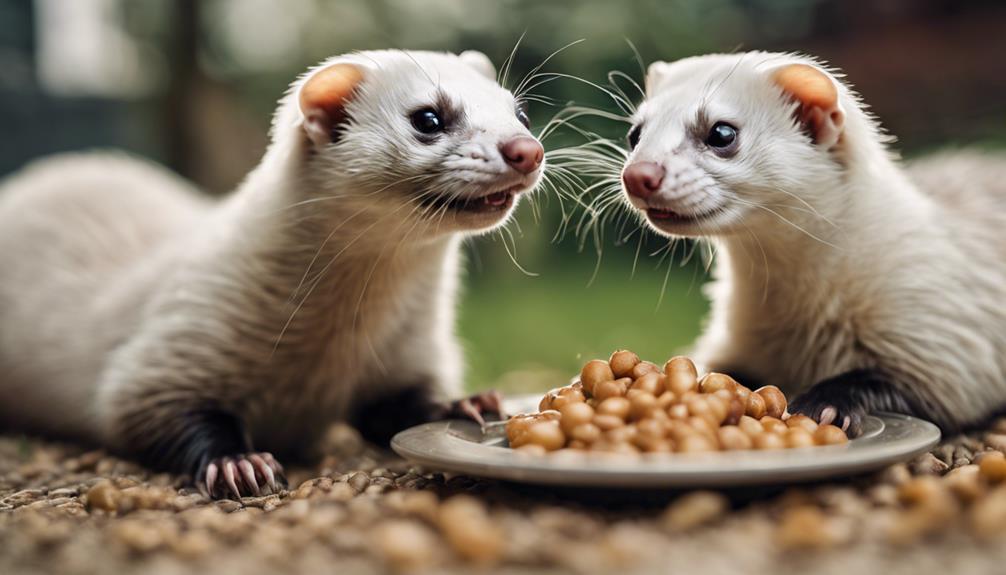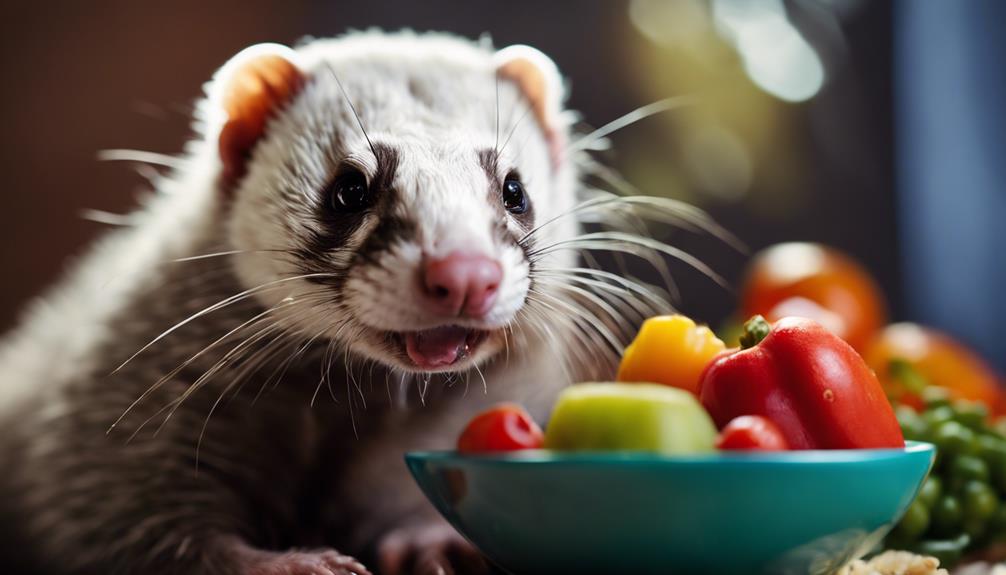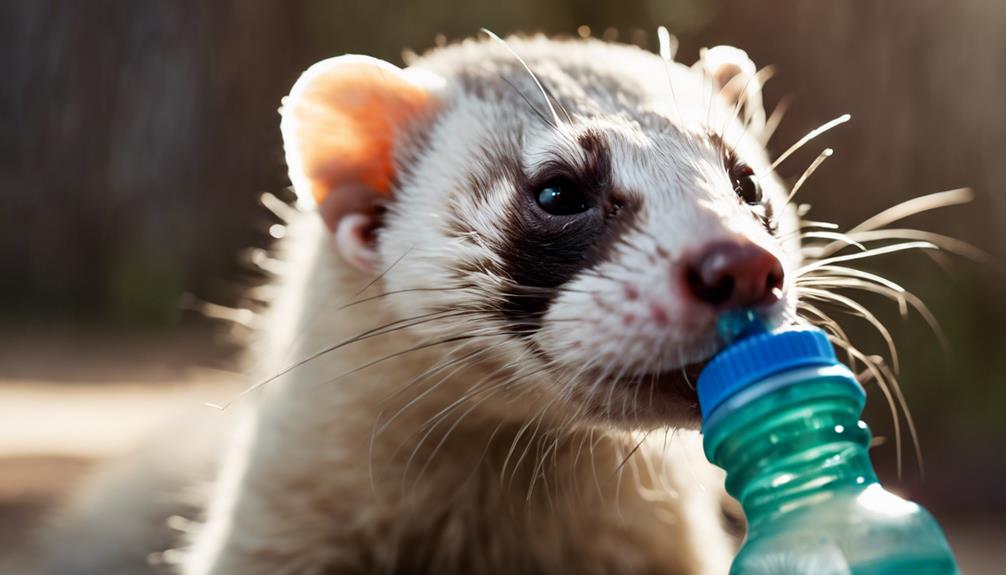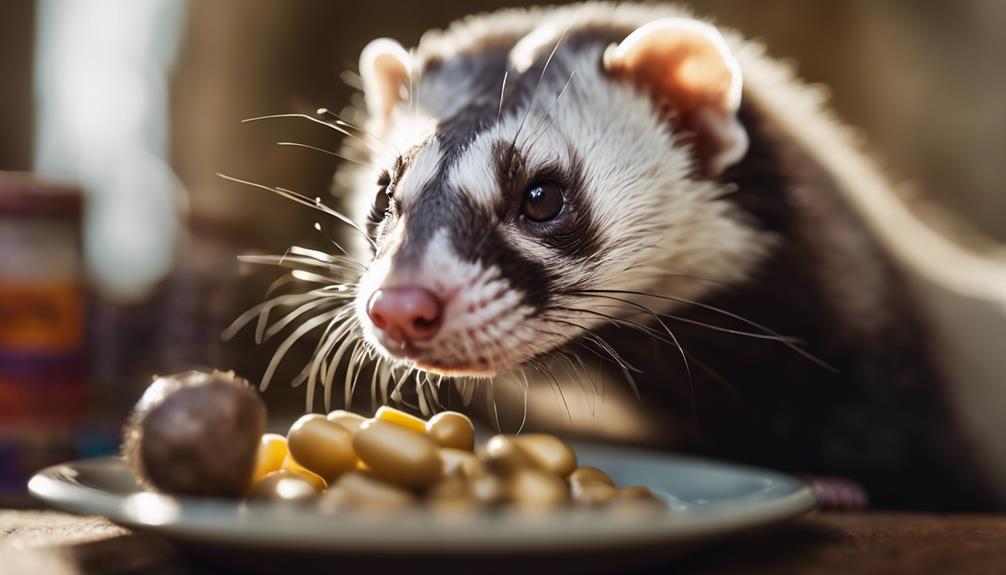Do Older Ferrets Have Different Nutritional Needs?

As ferrets age, their nutritional needs change. Older ferrets may require diets that are lower in fat and protein to prevent obesity and kidney issues. It's important to monitor their weight and adjust their diet accordingly. Additionally, older ferrets may benefit from supplements such as omega-3 fatty acids to support joint health and cognitive function. Providing a balanced diet with the right nutrients is crucial for keeping older ferrets healthy and active.
Understanding the evolving dietary requirements of older ferrets can help ensure they lead a happy and healthy life. Regular veterinary check-ups can also help assess their nutritional needs and make any necessary adjustments to their diet. By providing proper nutrition and care, you can help your older ferret live a long and fulfilling life.
Aging Process and Nutritional Changes
As ferrets age, their nutritional needs undergo significant changes due to physiological alterations in their bodies. One crucial aspect to consider for older ferrets is their digestive health. Aging ferrets may experience a decline in digestive function, leading to potential issues with nutrient absorption. To support their digestive systems, older ferrets may benefit from nutritional supplements specifically designed to aid in digestion. These supplements can help ensure that the aging ferrets are receiving the necessary nutrients from their diet, compensating for any deficiencies that may arise due to decreased digestive efficiency.
Maintaining optimal digestive health in older ferrets is essential for their overall well-being. By addressing potential digestive issues through the use of appropriate nutritional supplements, caregivers can help older ferrets maintain a healthy and balanced diet. Additionally, providing a diet rich in easily digestible nutrients can further support the digestive processes in aging ferrets, promoting their overall health and longevity.
Protein Requirements for Older Ferrets

As ferrets age, their protein requirements may change due to factors like reduced muscle mass and slower metabolic rates.
It's crucial for older ferrets to receive high-quality protein sources to support their overall health and wellbeing.
Providing easily digestible proteins from sources like poultry, eggs, and fish can help meet the protein needs of senior ferrets.
Aging and Protein Intake
With age, older ferrets require a higher intake of protein to support their changing nutritional needs. As ferrets age, their protein absorption and metabolism may decrease, leading to age-related muscle loss. Providing adequate protein in their diet becomes crucial to help maintain muscle mass and overall health. Here is a table outlining the protein requirements for older ferrets:
| Age (years) | Protein Intake (grams/day) | Recommended Protein Sources |
|---|---|---|
| 3-5 | 30-35 | High-quality ferret kibble |
| 6-8 | 35-40 | Cooked eggs, lean meats |
| 9+ | 40+ | High-protein ferret treats |
Meeting these protein intake levels can help older ferrets stay active, healthy, and maintain their muscle mass effectively.
Protein Sources for Seniors
Older ferrets, especially those aged 9 and above, benefit from a diet rich in protein derived from high-quality sources such as cooked eggs, lean meats, and high-protein ferret treats to support their increased protein requirements. Proteins of high quality are essential for senior ferrets as they aid in digestion and provide necessary amino acids crucial for their overall health.
When selecting protein sources for seniors, it's vital to prioritize digestibility and amino acid content to ensure optimal nutrient absorption. Additionally, senior ferrets may benefit from supplements tailored to meet their specific needs, as well as ensuring proper hydration levels to support kidney function.
Adjusting Fat Intake for Seniors

Senior ferrets may require adjustments in their fat intake to accommodate their changing nutritional needs. Fat regulation is crucial for senior ferrets as they age, as it plays a significant role in their overall health and well-being. Senior digestion tends to slow down with age, making it important to monitor the fat content in their diet to prevent issues such as weight gain or digestive problems.
Ferrets are obligate carnivores, meaning they require a diet high in protein and fat. However, as they age, their metabolism may slow down, leading to a decreased need for high-fat content in their diet. Lowering the fat intake for senior ferrets can help prevent obesity and related health issues that commonly affect older ferrets.
When adjusting fat intake for senior ferrets, it's important to consult with a veterinarian to ensure that their nutritional requirements are being met. They may recommend specific senior ferret diets that are lower in fat but still provide essential nutrients to support their aging bodies effectively. By carefully monitoring and adjusting the fat intake of senior ferrets, caregivers can help promote a healthier and happier life for their furry companions.
Importance of Fiber in Senior Ferret Diet

Fiber plays a crucial role in the digestive health of senior ferrets by aiding in the movement of food through the gastrointestinal tract. Additionally, fiber can help manage weight in older ferrets by promoting a feeling of fullness and regulating blood sugar levels.
Ensuring an appropriate fiber intake is essential for maintaining the overall well-being of aging ferrets.
Fiber for Digestive Health
A crucial component essential for maintaining optimal digestive function in aging ferrets is the incorporation of specific types of dietary fibers. These fibers play a vital role in promoting digestive health by supporting regular bowel movements, preventing constipation, and aiding in the overall absorption of nutrients.
Fiber supplements can be beneficial for senior ferrets to ensure they're receiving an adequate amount of fiber in their diet. Additionally, dietary fibers help in the fermentation process within the gut, promoting the growth of beneficial gut bacteria. By including a variety of fiber sources in the diet, such as vegetables, fruits, and high-fiber pellets, ferret owners can help their older pets maintain a healthy digestive system.
Fiber and Weight Management
Incorporating specific types of dietary fibers is crucial for managing weight effectively in aging ferrets, as these fibers play a pivotal role in regulating satiety and promoting a healthy body composition. Senior ferrets, like their younger counterparts, benefit from a diet that includes adequate fiber content for weight control.
Fiber intake in senior ferrets is essential for maintaining digestive health and preventing obesity. High-fiber foods can help senior ferrets feel full longer, reducing the likelihood of overeating and aiding in weight management. Additionally, fiber supports senior ferret digestion by promoting regular bowel movements and preventing constipation.
Senior Ferrets and Vitamin Needs

As ferrets age, their bodies undergo changes that may increase their need for specific vitamins to support their overall health and well-being. Aging ferrets may experience challenges in nutrient absorption, leading to potential deficiencies that can impact their health. It's crucial for senior ferrets to receive adequate vitamin supplementation to maintain optimal health and vitality.
Here are five essential considerations for meeting the vitamin needs of senior ferrets:
- Vitamin E: Supports immune function and helps protect cells from damage.
- Vitamin D: Crucial for calcium absorption and bone health.
- Vitamin B12: Aids in red blood cell formation and neurological function.
- Vitamin A: Essential for vision, growth, and immune function.
- Vitamin C: Acts as an antioxidant and supports immune system function.
Managing Hydration in Aging Ferrets

Maintaining proper hydration levels is crucial for supporting the health and well-being of aging ferrets. Hydration management is essential in preventing dehydration, especially as ferrets age and may be more prone to kidney issues. Aging ferrets may not always drink enough water on their own, so it's important for owners to monitor their water intake and ensure access to fresh, clean water at all times. One way to encourage hydration is by providing wet food in addition to dry kibble, as the moisture content in wet food can contribute to overall fluid intake.
Furthermore, dental care plays a significant role in hydration management for aging ferrets. Dental problems can make eating and drinking difficult for ferrets, leading to decreased water consumption. Regular dental check-ups and providing appropriate chew toys can help maintain dental health and ensure that aging ferrets can continue to eat and drink comfortably. By understanding the importance of hydration management and dental care, owners can support the overall health and quality of life of their aging ferrets.
Special Considerations for Senior Ferret Feeding

When feeding senior ferrets, owners must carefully tailor their dietary needs to accommodate age-related changes and ensure optimal nutrition. As ferrets age, they may experience a variety of health issues that require special considerations in their diet. Here are some key points to keep in mind when feeding senior ferrets:
- Dental health: Older ferrets may have dental problems such as tooth decay or gum disease, so it's important to provide them with a diet that promotes good dental health.
- Joint supplements: Senior ferrets are more prone to joint issues like arthritis, and incorporating joint supplements into their diet can help support their joint health.
- Reduced metabolism: Aging ferrets may have a slower metabolism, so it's essential to adjust their diet to prevent weight gain.
- Digestive issues: Older ferrets may have sensitive digestive systems, so easily digestible foods should be prioritized.
- Nutritional balance: Ensure that senior ferrets receive a balanced diet that meets their specific nutritional requirements to support their overall health and well-being.
Frequently Asked Questions
How Can I Tell if My Older Ferret Is Not Getting Enough Nutrients in Their Diet?
If an older ferret is not getting enough nutrients in their diet, signs such as weight loss, digestive issues, and dental problems may appear. Regular vet check-ups and adjusting their diet can help prevent nutrient deficiencies.
Are There Any Specific Supplements That Senior Ferrets Should Be Given to Support Their Health?
As ferrets age, their bodies undergo changes affecting nutritional requirements. To support senior ferret health, dietary supplements like omega-3 fatty acids can aid in joint health, while probiotics help maintain a healthy gut flora balance.
Can Older Ferrets Have Different Food Sensitivities or Allergies Compared to Younger Ferrets?
As ferrets age, they may develop age-related allergies leading to potential sensitivities to certain foods. Nutritional changes may be necessary to accommodate these sensitivities and ensure the older ferret's diet supports their health and well-being.
Is It Necessary to Change My Older Ferret's Diet as They Age, or Can They Continue Eating the Same Food?
As ferrets age, dietary changes become crucial for their longevity. Nutrient absorption may decrease with aging, necessitating adjustments in their diet. Providing a balanced and appropriate diet tailored to their changing needs can support their health and well-being.
Are There Any Specific Feeding Schedules or Meal Plans Recommended for Senior Ferrets to Maintain Their Health?
When it comes to senior ferret feeding, dietary requirements play a crucial role in healthy aging. Providing balanced meals rich in protein, fats, and essential nutrients is key. Regular vet check-ups and tailored nutrition plans are recommended for optimal health.










